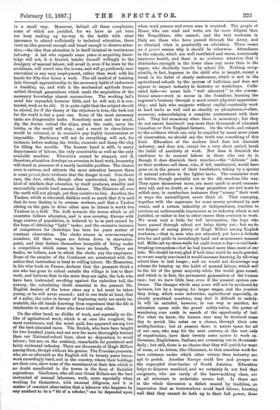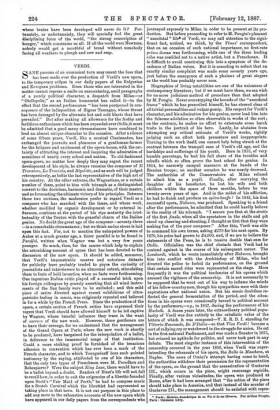DOES EDUCATION DIMINISH INDUSTRY?
THE Daily News of Monday, in an article advocating the introduction of workshops into National schools, men- tions and partly endorses a popular complaint. Many critics of our present system of primary instruction fear that it will breed up a generation with a distaste, and even contempt for manual labour. " The boys make less trusty workmen, and the girls worse cooks, and housemaids, and laundry-women." They " are lees handy and more conceited than a former generation ; have less liking for work, and more notions.' " The Daily Nettle is advocating a specific project, and therefore states its case strongly ; but there is no doubt it expresses a feeling very general not only with "the chums," but with employers of labour of all degrees, and especially with employer* in a small way. Moreover, behind all these complaints, some of which are justified, for we have as yet been too busy making up lee-way in the battle with utter ignorance to attend sufficiently to technical education, there rests an idea general enough and broad enough to deserve atten- tion,—the idea that education is in itself inimical to continuous industry. A lad who expends some years in acquiring know- ledge will not, it is fancied, betake himself willingly to the drudgery of manual labour, will avoid it, even if he loses by the avoidance, will crowd into the towns, and will go perilously near starvation in any easy employment, rather than work with his hands for fifty-four hours a week. The old method of training lads through apprenticeship to the necessary habit of endurance is breaking up, and with it the mechanical aptitude trans- mitted through generations which made the acquisition of the necessary knowledge almost unconscious. The working lad's mind has expanded, however little, and he will not, it is con- tended, work as he did. It is quite right that the subject should be stirred, for if the theory of the objectors is true, the look-out for the world is but a poor one. Some of the most necessary tasks are disagreeable tasks. Somebody most cart the muck, dig the drains, unload the ships, stack the coals, carry the bricks, or the world will stop ; and a resort to slave-labour would be criminal, or to excessive pay highly inconvenient or impossible. Machinery will not do everything, will not, for instance, before making the bricks, excavate and damp the clay for filling the moulds. The human hand is still, in many departments of labour, the only conceivable as well as the only available machine. Education cannot be stopped, and if, therefore, education develops an aversion to hard work, humanity will stand in presence of a nearly insoluble problem. The chance even is serious, and attracts the more attention because there is some prima-facie evidence that the danger is real. One clever race, the Jew, which, though often uneducated, has just the kind of intellect that education by itself produces, steadily and successfully avoids hard manual labour. The Hebrews all over the earth will not plough, yet they contrive to live. Another, the Yankee, which is educated, dislikes work so much that it is said that its true destiny is to oversee workers, and that a Yankee sitting on the gate to drive other men to labour is worth five Yankees in a field. The drift towards the towns which in all countries follows education, and is now covering Europe with huge centres of population, is believed to be in part caused by the hope of obtaining "light" tasks; and the excessive increase of competitors for clerkships has been for years matter of constant observation. The clerks swarm in ever-increasing numbers, till their wages are driven down to starvation- point, and they declare themselves incapable of living under a competition which seems to have no bounds. There are trades, we believe, now in which the clerks pay the employers. Some of the peoples of the Continent are penetrated with the notion that instruction is fatal to willing labour. Mr. Hamerton, in his wise book on France, declares that the peasants think a son who has gone to school outside the village is lost to their work, and believes that in the main they are right, the lads who have been instructed revolting against the unbroken toil, the penury, the calculating thrift essential to the peasant life. English dealers of the lower class say a lad must be taken young, or he will never succeed ; and in one trade at least, that of a sailor, the rules in favour of beginning early are made im- mutable, the old hands knowing from experience that the life is intolerable to most of those who have tried any other.
On the other hand, no dislike of work, and especially no dis- like of agricultural work, which is at once the roughest, the most continuous, and the worst paid, has appeared among two of the best-educated races. The Scotch, who have been taught for two hundred years, and are now far more thoroughly trained than our National-school boys, show no disposition to avoid labour; but are, on the contrary, remarkable for persistent and fairly contented industry. There are thousands of Hugh Millers among them, though without his genius. The Prussian peasants, who are as educated as the English will be twenty years hence, work exceedingly hard, and in the country, where their holdings are their own, show none of the resentment at their fate which is no doubt manifested in the towns in the form of Socialist aspirations. Gardeners, who all over Great Britain are the best instructed of maunal labourers, work, more especially when working for themselves, with unusual diligence, and it is matter of constant observation thats labourer who happens by any accident to be a" bit of a scholar," can be depended upon
when work presses and every man is required. The people of Rome, who can read and write, are far more diligent than the Neapolitans, who cannot ; and the best workmen in Italy are those who have passed through the Army, and so obtained what is practically an education. There seems no ei priori reason why it should be otherwise. Attendance in the schools, which are well ventilated and warm, notoriously improves health, and there is no evidence whatever that it diminishes strength in the lower class any more than in the upper, who decidedly benefit by school life. Nothing recog- nisable, in fact, happens to the child who is taught, except a break in his habit of steady endurance, which is met in the agricultural schools by the system of half-time, and does not appear to impair industry in factories or workshops. Culti- vated lads—we mean lads "well educated" in the conven- tional sense—work in scores in the foundries, learning the engineer's business through a most severe physical apprentice- ship; and lads who emigrate without capital constantly work at hard tasks as well and as steadily as ploughmen,—often, moreover, acknowledging a complete contentment with their toil. They feel monotony when there is monotony ; but they do not resent handwork any more than thousands of educated. Canadian or New England farmers. On the whole, and subject to the evidence which can only be supplied by many more years of observation, we should say the truth was something of this kind. Education of the modern kind does not diminish industry, and does not, except for a very short period, break the habit of assiduity at work. Nor does it diminish the readiness to do manual labour in those who can do it, though it does diminish their number,—the " delicate " lade, as their mothers call them, who, if left uneducated, would have gone on in the groove of their forefathers, taking by a species of natural selection to the lighter tasks. The remainder work as before, though probably not in the old, machinelike way. They spare themselves more, are more quick to avoid unneces- sary toil, and no doubt, as a large proportion are and must be selfish men, in numberless instances they " scamp " their work in ways the unintelligent never think of. That Ramping, together with the eagerness for more money produced by POW wants, and a certain indocility or independence, combine to produce an unfavourable impression as to industry which is not justified, or rather is due to other causes than aversion to work. We must wait a little for full information, the boys who have passed through school not being thirty yet ; but we do not despair of seeing plenty of Hugh Millers among English workmen,—that is, men who are educated, yet have a definite love for and pride in exceedingly hard and monotonous manual toil. Miller set up stone walls for eight hours a day—a real back- breaking occupation—but he had learned more than most of our lade. We should be-very glad if half-time could be made general, as we are nearly convinced it would increase learning, by allowing school time to last longer ; and we would not discourage any scheme for keeping np the habit of manual labour, which will be the lot of the great majority -while the world goes round, and which is, in fact, the permanent gymnasium of the human. race ; but we have little fear, even if the present system con- tinues. The changes which may come will not be produced-by laziness, but by a longing for larger wages, and the comfort they bring, which some industries, agricultural especially, is closely populated countries, may find it difficult to satisfy. It will be satisfied, however, in one way or another, Lor education opens wide the grand safety-valve, the power of wandering over earth in search of the opportunity of toil. For what we know, the human race may be destined some day to perish like mites on a cheese, through their DI1111 multiplication ; but at present there is ample space for AR of our race, who may for the next century, at the cost only of expatriation, have their twenty acres apiece to work en. Germane, Englishmen, Italians, are swarming out in thousands daily ; but still, there is no chance that they will perish for want of room, or be driven, like Chinamen, to that ceaseless work for bare existence under which other virtues than industry are apt to perish. Another Europe could live and prosper 4111 the unpeopled river-basins of South America. Education helps to disperse mankind, and we certainly do not find that emigrants, who are rarely of the know-nothing class, are at all reluctant to undertake severe toil. Is there nut in the whole discussion a defect caused by tradition, an impression that as brainworkers avoid bard labour, knowing well.that they cannot do both up to their full power, those
whose brains have been developed will never do it ? For- tunately, or unfortunately, they will specially feel the great disciplining force of the world, "the strong conscription of hunger," which constrains us all. If all the world were Newtons, nobody would get a mouthful of bread without somebody facing all weathers to plough and sow and reap.




































 Previous page
Previous page